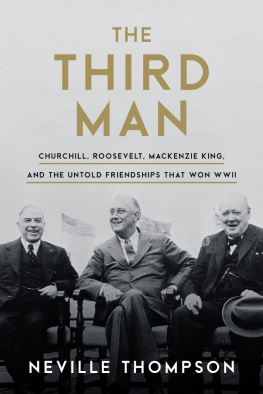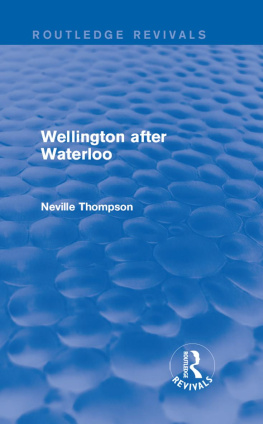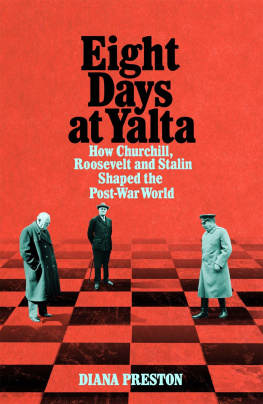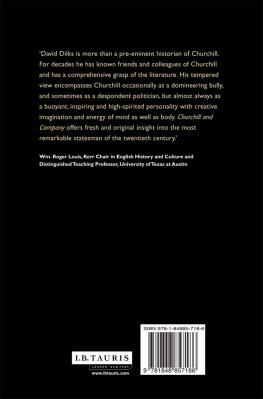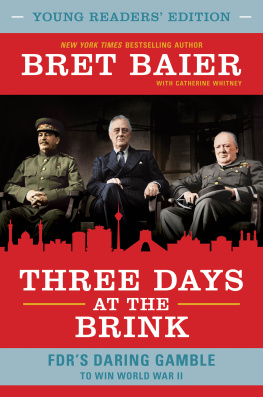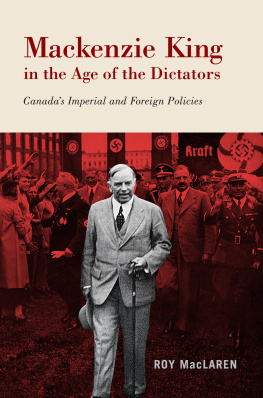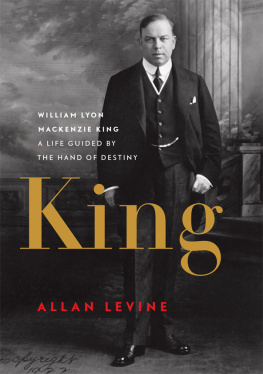Table of Contents
THE THIRD MAN
Churchill, Roosevelt, Mackenzie King, and the Untold Friendships that Won WWII
NEVILLE THOMPSON

Sutherland House
416 Moore Ave., Suite 205
Toronto, ON M4G 1C9
Copyright 2021 by Neville Thompson
All rights reserved, including the right to reproduce this book or portions thereof in any form whatsoever. For information on rights and permissions or to request a special discount for bulk purchases, please contact Sutherland House at
Sutherland House and logo are registered trademarks of The Sutherland House Inc.
First hardcover edition, May 2021
If you are interested in inviting one of our authors to a live event or media appearance, please contact and visit our website at sutherlandhousebooks.com for more information about our authors and their schedules.
Manufactured in Canada
Cover designed by Lena Yang
Book composed by Karl Hunt
Library and Archives Canada Cataloguing in Publication
Title: The third man : Churchill, Roosevelt, Mackenzie King, and the untold friendships that won WWII / Neville Thompson.
Names: Thompson, Neville, 1938- author.
Description: Includes bibliographical references and index.
Identifiers: Canadiana 20200259253 | ISBN 9781989555262 (hardcover)
Subjects: LCSH: King, William Lyon Mackenzie, 1874-1950. | LCSH: King, William Lyon Mackenzie, 1874-1950Friends and associates. | LCSH: Churchill, Winston, 1874-1965. | LCSH: Roosevelt, Franklin D. (Franklin Delano), 1882-1945. | LCSH: Prime ministersCanadaBiography. | CSH: CanadaForeign relations1918-1945. | LCSH: World War, 1939-1945Diplomatic history.
Classification: LCC FC581.K5 T46 2020 | DDC 971.063/2092dc23
ISBN (print): 978-1-989555-26-2
ISBN (EPUB): 978-1-989555-50-7
For
Lynton (Red) Wilson
In friendship and for service to history
Epigraph
Churchill has been raised up to meet the need of this day in the realm of war, to fight, with the power of the sword, the brute beasts that would devour their fellow men in their lust for power. Roosevelt, while far from being as great a man in his intellectual power, or military genius, is greater in his love for his fellow men and in his very sincere desire to improve their lot. Both men have great physical and moral courage but each is less great than he might have been had he been less personally ambitious to be great in the eyes of the world, less fond of and motivated in many ways by an inordinate desire for publicity. Churchill, I greatly fear, may not last out the war because of drink...I pray it may not be so and that he may be spared to enjoy some of the fruits of victory, which he more than any other single man deserves...The President has overtaxed his strength in other ways. He has had a harder battle in many ways than Churchill. His fight for the people has made him many and bitter enemies. He has done too much, I fear for purely political reasons the vast expenditures totally regardless of consequence, & which may leave the United States in an appalling condition some day He has used public office to ensure continuance of power, in some ways that can scarcely be justified but I believe that he has been sincere in his determination to better the conditions of the masses. He is more human than Churchill, each desire to be at the top, Churchill would like to be the ruler of an Empire (Conservative) Roosevelt the head of a Commonwealth (democrat). I wonder if his ambition to figure too largely on a world stage may not be his undoing & the undoing of his strength & of his political power?
Mackenzie King
Diary, December 19, 1943
Acknowledgements
My first and most grateful thanks must be to Kenneth Whyte, who edited the text so well. His skill in cutting, shaping and polishing is such that he is practically entitled to be the co-author. I also wish to thank Matthew Bucemi, the managing editor and associate publisher, for great help with many aspects of the manuscript and production. Neither they nor anyone else named here bears any responsibility for errors in the material or for the interpretation.
No author is an Island, entire of it self as John Donne generalized about humanity. Of the many who have aided and abetted along the way I should like to thank in particular my old friend Donald Smith, emeritus professor of history at the University of Calgary, who also provided the copy of an important letter from Roosevelt to King; Marian Soroka, an historian of Russia and nineteenth century diplomacy now living afar in Aquitaine and London, England; and, closer to home, Shauna Devine, an historian of medicine and the United States, who invited, indeed with a whim of iron insisted that I share her classroom lecture on President Roosevelt that was filmed for the C-span video library. I have greatly enjoyed and benefitted from discussing Mackenzie King, his international policies before the second world war and much else with the Hon. Roy MacLaren whose achievements go far beyond writing fine books on Canadian history. It will easily be seen that the view presented here differs from the one in his Mackenzie King and the Dictators (2019) but in Clios house are many mansions. The fruitful interplay of interpretations results in a better understanding of the past.
At the University of Western Ontario I am grateful to the D. B. Weldon Library for providing a study carrel in what is now my intellectual home. Books furnish more than a room. As Samuel Johnson said, A man will turn over half a library to write one book. Elizabeth Mantz, the history specialist, and all the librarians are a cheerful and ever-present help, I am also grateful to the members of the history department, present and past, including those now alas on a farther shore, who have for decades supplied collegial intellectual stimulus and camaraderie.
The book is dedicated to my friend and undergraduate classmate at McMaster University, Lynton (Red) Wilson in appreciation of his outstanding commitment and effective help to history, from research to popular dissemination. Following a stellar career in the public service and business, he co-founded (with Charles Bronfman) Historica Canada which encourages and supports the subject particularly in schools and on television. At McMaster, where he served as the chancellor from 2007-13, he established the L. R. Wilson Chair in Canadian History and the Wilson Institute for Canadian History housed in a new liberal arts building that he sponsored and rightly bears his name. I can only stand in awe and admiration of these and his other major and lasting contributions to history and much else in our alma mater and country.
To my wife Gail and our daughter Elizabeth, who put up with me in this and much else, my love as always.
Introduction: The Atlantic Triumvirate
The partnership of Winston Churchill and Franklin Delano Roosevelt in the Second World War is one of the most momentous in history. Scarcely anything about the relationship of two of the towering figures of the twentieth century can fail to be of interest. They not only directed historic world events but in speeches and in conversations ennobled their aims in grand and memorable terms. They were two of the great orators of history and, until late in the war, when Roosevelt in particular was close to death, they competed, publicly and privately, with each others eloquence. But this does not mean that they were entirely open in their exchanges with each other, and much less to the public.

